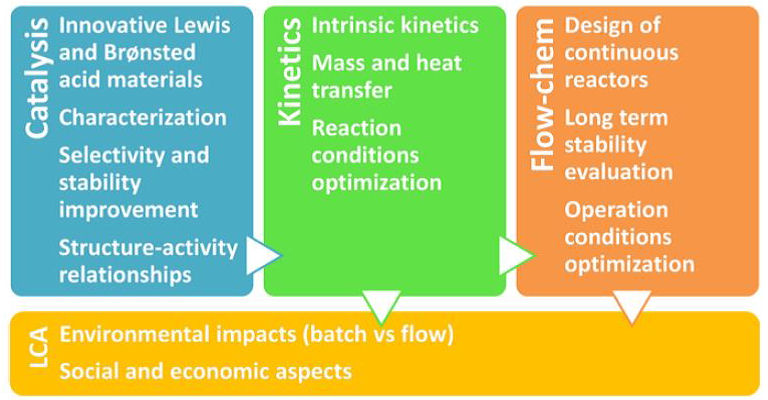 The project LEVANTE deals with the development of new catalytic processes for the valorization of one of the top-12 bio-based building block, levulinic acid (LA) and its esters (LE). These compounds derive directly from ligno cellulose, that is the most abundant non-food, waste biopolymer, thus being, the most promising feedstock to meet the criteria of a more sustainable circular economy. The contemporary presence of two functionalities (carbonylic and carboxylic) on LA and LE, make them very attractive andversatile molecules due to the variety of conversions and functionalization that are possible. This project will be focused on three classes: (i)levulinic ketals, used in industry as solvents, fuel additives, plasticizersor biodegradable surfactants; (ii) diphenolic acid (DPA), employed for epoxy resin and polycarbonate production; (iii) -valerolactone (GVL) and other reduction products (GVL-RP), finding application as green solvents, biofuels and platform chemicals.
The project LEVANTE deals with the development of new catalytic processes for the valorization of one of the top-12 bio-based building block, levulinic acid (LA) and its esters (LE). These compounds derive directly from ligno cellulose, that is the most abundant non-food, waste biopolymer, thus being, the most promising feedstock to meet the criteria of a more sustainable circular economy. The contemporary presence of two functionalities (carbonylic and carboxylic) on LA and LE, make them very attractive andversatile molecules due to the variety of conversions and functionalization that are possible. This project will be focused on three classes: (i)levulinic ketals, used in industry as solvents, fuel additives, plasticizersor biodegradable surfactants; (ii) diphenolic acid (DPA), employed for epoxy resin and polycarbonate production; (iii) -valerolactone (GVL) and other reduction products (GVL-RP), finding application as green solvents, biofuels and platform chemicals.
The processes involved in LEVANTE project will be studied using mainly oxides and mixed oxides and hydrochar catalysts. After a first screening phase, in which commercial materials will be tested, we will focus on the design and the preparation of new catalysts, by tuning their acid-base properties, such as Lewis and Brønsted acidity and the relative strength, through different preparation and functionalization techniques.
LEVANTE will be developed in line with the principles of green chemistry, especially regarding the catalysis and the atom economy, to make the target compounds fully renewable, in particular the use of: (i) glycerol for thesynthesis of ketals; (ii) lignin-derived phenols for the synthesis of DPA; (iii) bioethanol as hydrogen source in reduction reactions; (iv) biomass-derived chars as catalysts.
With the developed know-how in batch operation, to improve the productivity of the processes, lab-scale in flow-reactor prototypes, following the footsteps of the flow-chem methodology, will be realized, and optimized forall the mentioned processes. Life Cycle Assessment (LCA) evaluations will be conducted to compare batch and in-flow technologies versus the conventional chemical routes (where existing).
The reaction will be studied to obtain fundamental kinetic and catalytic parameters to gather the necessary knowledge for the scale up in perspective of a real industrial application. To enhance the applicability of there search outcomes, booklets will be prepared to sketch the lab-scale prototypes, sharing them with possible stakeholders.
To sum up, LEVANTE project opens the way to innovative levulinic acid valorization by advanced novel technologies.


